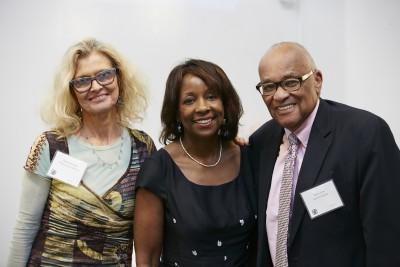
Terriers InBiz is a series that highlights Boston University alumni who have been innovative leaders in their field and have played a significant role in businesses, locally or globally.
After graduating from Anderson University in 1970 and before entering Boston University’s School of Social Work, Regina Snowden had already created her own business. The social justice advocate for young people with disabilities founded Partners for Youth with Disabilities in 1985, a nonprofit organization based in Boston. Now, more than 30 years after its founding, Snowden is the executive director.
“PYD empowers youth with disabilities to reach their full potential by providing transformative mentoring programs, youth development and inclusion expertise,” Snowden said. “We motivate youth to reach their personal, educational and career goals and guide organizations in becoming more inclusive.”
The program works with children and adults, ranging from age six to 24, and includes one-on-one and group mentoring. The latter may focus on health care, fitness, recreation, athletics, theater, employment or transition to work — any subject participants may require supervised assistance with.
Snowden’s interest in helping those with disabilities, though, started much before her business. After obtaining a degree in social work as an undergraduate, she moved to Massachusetts, where she would later attend graduate school at BU. Her time in the commonwealth further confirmed her devotion to helping others.
“When the time came to implement a long-held desire to obtain a [master’s in social work], I explored the many wonderful educational opportunities in the Boston area,” she said. “I selected Boston University due to the opportunity to have the academic and inspirational mentoring of the dean of the School of Social Work at that time, the great Hubie Jones.”
By the time she created PYD, Snowden was working at another mentoring program.
“I was brought on part-time as a program director within the Justice Resource Institute to help oversee a mentoring program for girls that were court referred,” Snowden said.
She found the work fitting, saying that she was interested in adolescents at the developmental age. Her work at JRI was a “wonderful experience,” but she felt the need to create for herself something that more so reflected her personal navigation.
“At this time, there were few year-round programs serving the youth,” she said. “They would be turned away from many of the other youth-serving organizations.”
To get PYD off the ground, Snowden said she first needed mentors.
“Ideally to me, the mentors would be best … would have also a disability similar to the youth,” she said. “The concept of relating to an adult who had experienced disability as a child would be [a person] many youth could identify with.”
Nine adults with disabilities ended up responding to her notice concerning a mentorship program. While interviewing the adults, Snowden said that each person she spoke to mentioned the need for a program akin to PYD. When the adults themselves were introduced to the youth, the reaction between them was what Snowden described as an “amazing” one.
The mentors addressed topics relating to their employment, use of transportation, social life and education.
“The youth asked questions … and the adults were thrilled to give back [answers],” Snowden said.
The program, though, speaks to its founder on an even more personal level. She too identifies as a person with a disability.
“I found that I was one of the many of the large segment of the population that has a ‘hidden disability,’” she said. “That in itself made me identify with persons with disabilities. When I came to recognize the range of learning disabilities that were being included in this movement, I knew that I had found my voice, for others and for myself.”
Snowden is hopeful that the nonprofit will continue on this same course for the long term.
“The future would be to continue this course and mobilize the current momentum to bring these programs to even higher realms of utilization and replication throughout the nation,” she said.
According to Snowden, this is already happening on various local and state levels.
She added, “Our employment and mentoring program, along with the efforts of our National Center, are programs that are in the process of receiving the most significant resources in our history to build out both our quantity and quality of delivery [to youths] statewide and in some areas nationally.”



























































































































Ruth Housman • Apr 12, 2016 at 1:39 pm
This lovely article comes right after I have been to two movies in the Reel Abilities series. Last night I was at Perkins, watching an amazing movie about a wonderful Goodwill endeavor in Florida. Young people and older, with various, severe problems, a true mix of people, variously labelled and I don’t like labels, but with autism, retardation, serious mental illness, blindness.. a litany of angst… these people, all work at this particular Goodwill facility, and a phenomenal man, Javier, has managed to bring them together, to form a real band, to teach them not just music, but how to play together, and it’s truly a “webbed feat” and a marvel, what they, and Javier have managed. It’s humbling in the extreme. I feel I was meant to be there, just as I am meant to be here right now, to honor this particular program, a woman named Snowden, the immediacy of what we’re doing NOW. I graduated in 1982 and I loved, Hubie Jones